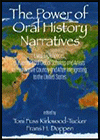
The Power of Oral History Narratives
Lived Experiences of International Global Scholars and Artists in their Native Country and After Immigrating to the United States
Edited by:
Toni Fuss Kirkwood-Tucker, Florida State University
Frans H. Doppen, Ohio University
Published 2023
The significance of this book is its uniqueness. First, the book contains a collection of fourteen chapters that capture the personal, professional, and historical experiences of international global scholars and artists to which they were subjected in their native country and after they immigrated to the United States. What makes this book project highly unusual in comparison to other publications is that these international global scholars and artists experienced historical events of trauma and joy in their native country and in their newly adopted country of the United States that lie deeply buried in their sub-consciousness; that these memories are unforgettable and still painful for them; that these memories are a constant companion in their daily lives; and that the experienced historical events of trauma and joy have shaped their professional and personal lives to this very day. There exists a paucity in the global education literature of this far-reaching topic and, thus, it has the potential to enhance and diversify the global education literature.
Second, the significance of this book lies in the pedagogical power of the oral history narrative tradition and its impact on students at the secondary and tertiary levels in education. When one’s lived experiences of trauma or joy occur during a critical time in history, they rarely yield unforgotten memories and deeply held private knowledge that do not come to light without a storyteller. When first-hand accounts are shared publicly, they can bring powerful insights into past historic events to the very presence. Thus, the pedagogical strength of this book contributes to knowledge creation in the classroom as oral histories move students from abstract textbook descriptions to concrete and compelling “lived” stories associated with historical happenings. This pedagogy leads students to become more critical of historical events of the past and develops in them a deeper understanding of the past. Consequently, oral history narratives enable teachers and teacher educators to enrich the abstract text of textbooks with the authentic voice of the individual.
A third significance of this book lies embedded in the rich historical perspective displayed by storytellers of non-native international global scholars and artists from around the world who portray their lived-through, first-hand experiences such as child labor, communism, hate, hunger, fascism, fear, intolerance, discrimination, prejudice, poverty, war, protest, and death. Finally, a major purpose of this book is to expose young learners from around the world to empowering non-native international role models in global education and the arts from nations in Africa, Asia, the Caribbean, Eurasia, Europe, the Middle East, and South America who build bridges—not walls—between peoples and nations.
CONTENTS
Acknowledgments. Genesis of Our Book. Significance of Our Book. Methodology. Outline of Narratives. Introduction. SECTION I: AFRICA. Nigeria | Storied Narrative Across Time and Space: My Experiences Growing Up in Nigeria and Straddling Two Cultures in the United States, Omiunota Nelly Ukpokodu. Zimbabwe | The Cultural Confluence of Ubuntu: A Journey From Zimbabwe to Global Educational Leader in the United States, Josiah Tlou. SECTION II: ASIA. Japan | Repairing and Mending Broken Objects With Gold: The Story of a Global Citizen Coming-of-Age, Misato Yamaguchi. Nepal | Miseducation, Travels, and Contesting Racialized Worlds Within and Outside Academia, Binaya Subedi. People’s Republic of China | Navigating Historical Currents: Reflections of a Chinese-Born Global Educator, Lin Lin. People’s Republic of China | The “New Frontier” to the “New World”: Stories of Surviving, Striving, and Thriving in China and the United States, Yali Zhao. People’s Republic of China | Teaching for a Sustainable Future: Crafting a Pedagogy for Sustainability Education, Guichun Zong. SECTION III: CARIBBEAN. Cuba | Flight to Freedom: A Cuban Immigrant’s Journey Through Education, Bárbara C. Cruz. SECTION IV: EURASIA. Ukraine/Russia | Tearing Human Minds to Pieces: The Power of Hypocrisy and the Hypocrisy of Power, Anatoli Rapoport. SECTION V: EUROPE. France | My Dream of Becoming a Contemporary Classical Composer Advocating for the Armenian Genocide, Hayg Boyadjian. Germany | Nazism. Bordercrossing. Racism. All Lives Are of Equal Worth, Toni Fuss Kirkwood-Tucker. The Netherlands | On Crossing the Big Pond, Frans H. Doppen. SECTION VI: MIDDLE EAST. Turkey | Fractured Visions of Remembrance, Varteni Mosdichian. SECTION VII: SOUTH AMERICA. Argentina | From Buenos Aires to Buffalo to Books: The Politics of Populism, Aixa Pérez-Prado. Epilogue. About the Editors. About the Contributors.
-
Paperback979-8-88730-297-3
Web price: $62.04 (Reg. 72.99)
-
Hardcover979-8-88730-298-0
Web price: $89.24 (Reg. 104.99)
- eBook979-8-88730-299-7

- EDU020000 - EDUCATION: Multicultural Education
- HIS035000 - HISTORY: Study and Teaching
- EDU038000 - EDUCATION: Student Life & Student Affairs
-
 Affirming Identity, Advancing Belonging, and Amplifying Voice in Sororities and Fraternities
Affirming Identity, Advancing Belonging, and Amplifying Voice in Sororities and Fraternities
-
 Creating New Possibilities for the Future of HBCUs
From Research to Praxis
Creating New Possibilities for the Future of HBCUs
From Research to Praxis
-
 History Education and Historical Inquiry
History Education and Historical Inquiry
-
 Latinx College Students
Innovations in Mental Health, Advocacy, and Social Justice Programs
Latinx College Students
Innovations in Mental Health, Advocacy, and Social Justice Programs
-
 Learning to Hide
The English Learning Classroom as Sanctuary and Trap
Learning to Hide
The English Learning Classroom as Sanctuary and Trap
-
 Special Education During the Pandemic
Considerations for Change in Practice
Special Education During the Pandemic
Considerations for Change in Practice
-
 What Comes After Lunch?
Alternative Measures of Economic and Social Disadvantage and Their Implications for Education Research
What Comes After Lunch?
Alternative Measures of Economic and Social Disadvantage and Their Implications for Education Research

